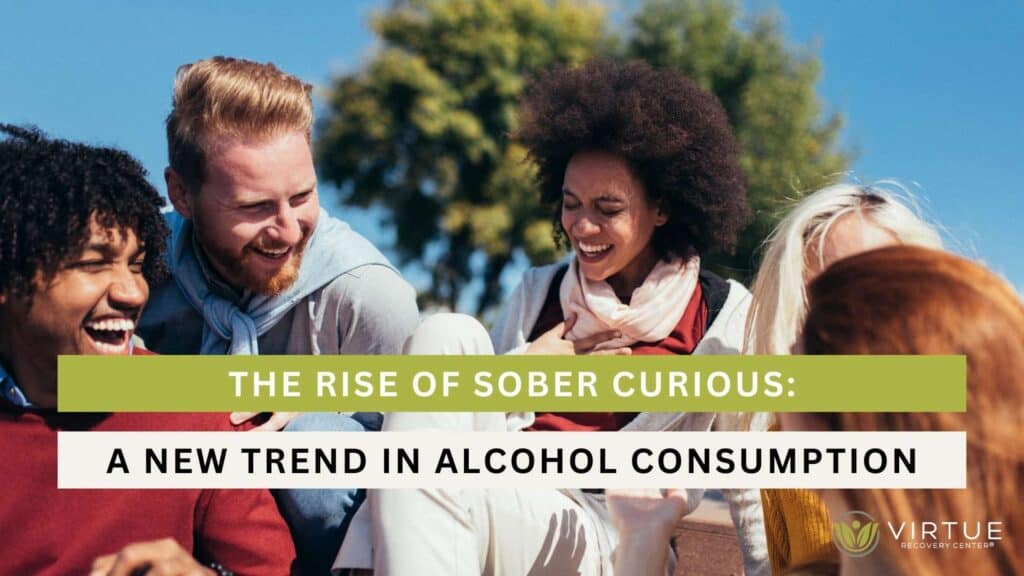
Table of Contents
Key Takeaways
- The sober curious movement is gaining popularity as more people explore reducing or eliminating alcohol from their lives for health and wellness.
- Understanding the sober curious concept and its origins helps in recognizing the shift in societal attitudes toward alcohol.
- Health benefits, social and cultural shifts, and increased mental health awareness are key drivers behind this trend.
- Embracing a sober, curious lifestyle can improve physical health, enhance mental clarity, and have positive social and emotional effects.
- The rise of the sober curious trend has impacted the alcohol industry, leading to the growth of nonalcoholic beverages.
Introduction to The Sober Curious Movement
The sober curious movement is a growing trend in which individuals choose to reduce or eliminate alcohol from their lives. This movement is driven by a desire for better health and wellness and a shift in societal attitudes toward alcohol consumption. Understanding this trend is crucial as it reflects changing lifestyles and priorities.What Does Sober Curious Mean?
The term sober curious refers to people who intentionally question their relationship with alcohol and explore a lifestyle with reduced or no alcohol consumption. The concept gained traction with the “Sober Curious” publication by Ruby Warrington in 2018. Influential figures like Ruby Warrington and events like Dry January have popularized the movement. Additionally, celebrities and social media influencers have promoted sobriety as part of a healthy lifestyle, further driving the trend.Reasons Behind the Trend
Health Benefits
Reducing alcohol intake can lead to weight loss, better sleep, and improved physical and mental health. It also lowers the risk of diseases associated with alcohol consumption, such as liver disease and certain cancers. Cutting back on alcohol has various health benefits this movement is taking advantage of. Abstinence from drinking alcohol can lead to greater focus and blissful sleep and improve your mood.Social and Cultural Shifts
Social norms are changing, with more people choosing activities that don’t involve drinking. There’s also an increased availability and acceptance of nonalcoholic beverages in social settings, making it easier for people to embrace a sober, curious lifestyle. The new generations are participating in more activities that are without alcohol and don’t revolve around a drinking culture.Mental Health Awareness
There’s growing recognition of the negative impact of alcohol on mental health. Many individuals are seeking mental clarity and emotional stability without relying on alcohol. As a result, more people are exploring healthier alternatives and engaging in practices that promote their overall well-being. This shift in perspective is crucial, especially as understanding alcohol addiction treatment becomes essential for those looking to break free from dependency. By prioritizing mental health and seeking professional guidance, individuals can pave the way toward a more fulfilling life. Additionally, community support plays a vital role in this journey, as individuals connect with others who share similar experiences. Many are now recognizing the importance of seeking help for alcoholism, which can provide them with the tools and resources needed for recovery. Embracing this change not only enhances personal growth but also fosters a supportive environment for others who may be struggling. Many individuals are also considering out-of-state treatment benefits, which can offer a fresh start and a distance from triggers associated with their previous environments. This change of scenery often contributes to a more focused recovery experience, allowing individuals to immerse themselves in their healing journey. As awareness grows, the stigma surrounding seeking help diminishes, empowering more people to take decisive steps toward a healthier, alcohol-free life.Benefits of Being Sober Curious
Physical Health Improvements
Adopting a sober curious lifestyle can enhance energy levels and physical fitness. It also significantly reduces the risk of developing alcohol-related illnesses.Enhanced Mental Clarity
People who reduce or eliminate alcohol often experience improved focus, memory, and cognitive functions. This clarity also contributes to more excellent emotional stability and reduced anxiety and depression.Social and Emotional Benefits
Embracing a sober curious lifestyle can result in more robust, authentic relationships. Without the influence of alcohol, individuals often experience increased self-awareness and personal growth.How to Embrace the Sober Curious Lifestyle
Tips for Reducing Alcohol Consumption
Start with small changes, such as limiting drinking to certain days. Tracking drinking habits and setting clear goals for reduction can also be helpful.Alternatives to Alcohol
Explore nonalcoholic beverages like mocktails, alcohol-free beers, and wines. Additionally, finding new social activities that don’t center around drinking can support a sober curious lifestyle.Finding Support and Community
Join online communities or local groups focused on sobriety. It is also crucial to seek support from friends and family who respect and support your choice.Change up your hobbies
Embracing a sober curious lifestyle often opens up the opportunity to explore new hobbies and interests that don’t center around alcohol. Whether taking up a new sport, diving into creative pursuits like painting or writing, or joining social groups focused on hiking, cooking, or book clubs, shifting your focus to alcohol-free pastimes can enrich your life. These new hobbies not only fill the time that might have previously been spent drinking but also promote healthier habits, provide mental stimulation, and offer new ways to connect with others who share similar interests.The Impact on the Alcohol Industry
Changes in Market Trends
There is an increasing demand for nonalcoholic alternatives, leading bars and restaurants to expand their nonalcoholic beverage offerings.Rise of nonalcoholic Beverages
The market for alcohol-free beers, wines, and spirits is growing. Significant innovation is also occurring in creating flavorful and satisfying nonalcoholic options.
Are You Covered For Treatment?
At Virtue Recovery Center, we understand the importance of accessible care. That’s why we’re in-network with numerous private insurance companies, ensuring that your journey to recovery is supported from the start. Let us help you quickly and easily verify your insurance coverage. Begin your path to healing today.
Are You Covered For Treatment?
At Virtue Recovery Center, we understand the importance of accessible care. That’s why we’re in-network with numerous private insurance companies, ensuring that your journey to recovery is supported from the start. Let us help you quickly and easily verify your insurance coverage. Begin your path to healing today.
Conclusion
The sober curious movement is more than just a trend; it reflects changing attitudes towards alcohol and a desire for healthier, more fulfilling lifestyles. Whether for health reasons, mental clarity, or social connection, exploring a sober curious lifestyle offers numerous benefits. If you or someone you love is struggling with addiction, please call us at 866-461-3339 for help.FAQs
What is the sober curious movement?
The Sober Curious movement encourages individuals to question their relationship with alcohol and consider reducing or eliminating it from their lives. This approach promotes mindful drinking and making conscious choices about alcohol consumption.How can I start a sober curious journey?
Begin by setting clear goals, tracking your drinking habits, and finding nonalcoholic alternatives. Joining supportive communities and seeking encouragement from friends and family can also help you start your sober curious journey. Additionally, educating yourself on alcohol addiction symptoms and effects can provide valuable insights into your relationship with alcohol. Understanding the ways it can impact your health and well-being may strengthen your resolve to seek a healthier lifestyle. Remember to celebrate small victories along the way, as each step towards sobriety brings you closer to a more fulfilling life. Additionally, it’s important to recognize the signs you may be an alcoholic, as this awareness can be a crucial step in your journey. Reflecting on your consumption patterns and how they affect your daily life can help clarify your relationship with alcohol. Seeking professional guidance may also provide support in addressing any underlying issues and reinforcing your commitment to sobriety. Additionally, taking the time to learn about the potential consequences of excessive drinking, including an alcoholrelated liver disease overview, can deepen your understanding of the risks involved. This knowledge can further motivate you to maintain healthier choices and seek out resources for support. Ultimately, fostering a mindful approach to your drinking can lead to long-term benefits for both your physical health and mental well-being.Are there any health benefits to reducing alcohol consumption?
Yes, reducing alcohol intake can improve physical health, mental clarity, and emotional well-being. Benefits include better sleep, enhanced cognitive function, reduced anxiety and depression, and a lower risk of alcohol-related diseases.What are some popular nonalcoholic beverages?
nonalcoholic beers, wines, and mocktails are becoming increasingly popular as alternatives to traditional alcoholic drinks. These beverages offer the social and sensory experience of drinking without the effects of alcohol.How can I find a community that supports the sober curious lifestyle?
Look for online forums, social media groups, and local meetups focused on sobriety and the sober curious movement. Engaging with these communities can provide support, encouragement, and shared experiences from others on a similar journey.What are the rules of sober curious?
There are no strict rules; it involves consciously reducing or eliminating alcohol intake to explore its impact on health and wellness.Can a sober curious lifestyle have mental health benefits?
Yes, it can improve mental health by reducing anxiety, enhancing mood stability, and promoting better sleep.How can sober curiosity support cancer prevention?
Reducing alcohol intake lowers the risk of several types of cancer, as alcohol is a known carcinogen.How can sober curiosity help you to reduce or stop drinking?
It encourages mindful drinking, helping individuals recognize and address their reasons for drinking and explore healthier alternatives.What is Dry January?
Dry January is a public health campaign where participants abstain from alcohol for the month of January to reset their relationship with drinking.How Does the Sober Curious Movement Influence New Year’s Eve Celebrations Without Alcohol?
The sober curious movement is reshaping how people celebrate new year’s eve sober. By prioritizing mindfulness and connection, individuals are finding joy in festivities without alcohol. Creative mocktail bars, engaging activities, and reflective conversations bring a fresh twist, allowing everyone to welcome the new year with clarity and intention.
Resources
https://www.ncbi.nlm.nih.gov/pmc/articles/PMC4684010/ https://www.webmd.com/mental-health/addiction/ss/slideshow-quit-alcohol-effects https://www.nhs.uk/better-health/drink-less/Are You Covered For Treatment?
At Virtue Recovery Center, we understand the importance of accessible care. That’s why we’re in-network with numerous private insurance companies, ensuring that your journey to recovery is supported from the start. Let us help you quickly and easily verify your insurance coverage. Begin your path to healing today.
- About the Author
- Latest Posts
Nicki Lugo, CPC, LAC, LCADC, CCTS( Clinical Director )
Nicki Lugo is currently employed as Clinical Director at Virtue Recovery Center in Las Vegas. Nicki is a licensed clinical professional counselor (CPC) in the state of Nevada and a licensed associate counselor (LAC) in the state of Arizona. She is also a licensed clinical alcohol and drug counselor (LCADC) in Nevada. Additionally, Nicki has specialized training in treating trauma and is a certified clinical trauma specialist (CCTS).
Nicki has earned a Master of Science degree in Psychology with an emphasis in Behavioral Health from the University of Phoenix and a Master of Science in Professional Counseling from Grand Canyon University. Currently, Nicki is pursuing a Doctor of Philosophy (PhD) in Counseling Education and Supervision at Grand Canyon University. Nicki’s research interests include the use of Positive Psychology interventions with dual diagnosis clients. Nicki hopes to contribute to the body of knowledge in treating substance use disorders.
Nicki’s long-term career goals include advancing in leadership roles within Virtue Recovery Center which is a quickly growing substance use disorder treatment facility. She hopes that one day her research and advocacy will help to save the lives of those who have been affected by substance use. She likes to say that advocacy is her passion and leadership is her superpower.
How Cognitive Behavioral Therapy Supports Lasting Sobriety After Cocaine Addiction …
How an Eating Disorder Program Helps Manage Binge-Eating Episodes Key …
Key Takeaways Regular exercise reduces cravings and withdrawal symptoms. Physical …
Key Takeaways Veterans Day began as Armistice Day in 1918 …
Key Takeaways Proper nutrition plays a vital role in addiction …
Key Takeaways Long-term sobriety is achievable with evidence-based addiction treatment …


























